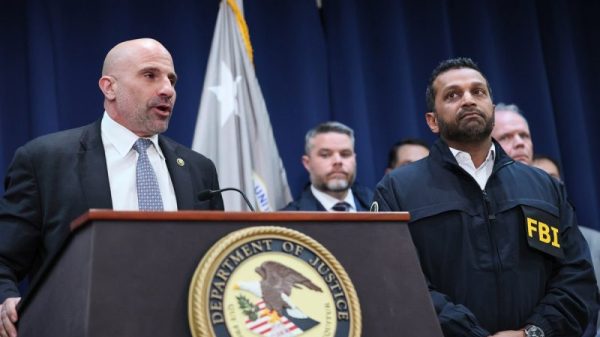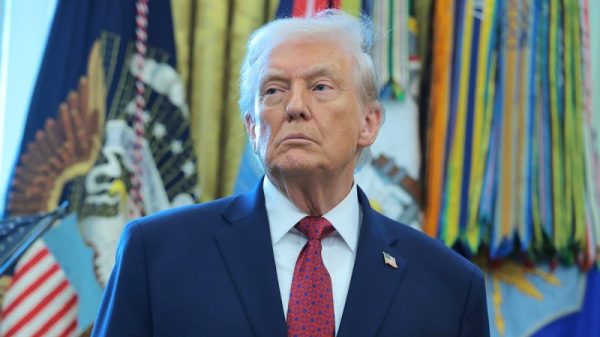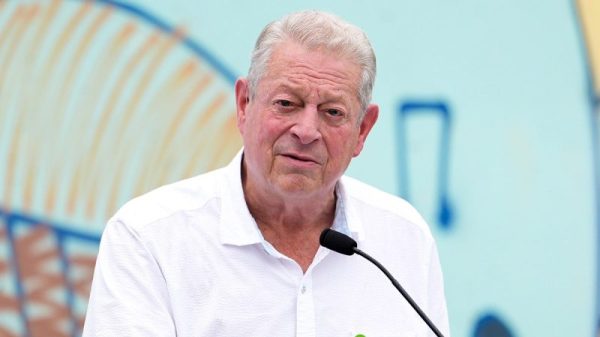Former president Donald Trump’s name is set to appear on Michigan’s primary ballot after the state Supreme Court declined Wednesday to hear a challenge to his candidacy.
The decision not to hear the case comes a week after the Colorado Supreme Court determined that Trump engaged in insurrection on Jan. 6, 2021, and is barred from running under the Constitution. Trump plans to appeal that ruling to the U.S. Supreme Court, which could determine for all states whether Trump can run again.
The Michigan decision provides Trump with a new victory as he tries to get himself restored to the ballot in Colorado and avoid getting knocked off the ballot in other states.
Section 3 of the 14th Amendment of the Constitution bars from office those who engaged in insurrection after swearing an oath to uphold the nation’s founding document. The amendment was adopted three years after the end of the Civil War, and the section on insurrectionists was meant to keep former Confederates out of office.
Trump’s opponents have argued that the provision prevents him from running because of his actions leading up to and during the Jan. 6 attack on the U.S. Capitol as Congress met to certify Joe Biden’s victory. They have filed lawsuits around the country to try to keep Trump off the ballot.
Ongoing investigations involving Donald Trump
1/6
End of carousel
In Michigan, a lower court judge and an appeals court said Trump could remain on the ballot there. Those courts determined that state law allows political parties to determine which candidates can run in presidential primaries and doesn’t allow election officials to keep them off the ballot under Section 3. The courts reached no conclusions about whether Trump had engaged in insurrection.
The Michigan Supreme Court on Wednesday said it would not take up the case, allowing the appeals court ruling to stand. In dissent, Justice Elizabeth Welch argued that the state’s high court should have taken up the case on the merits. She wrote that she agreed with the appeals court’s finding that the secretary of state can’t keep candidates off the ballot under Section 3.
The high court in Colorado went in a different direction, finding in a 4-3 ruling last week that Trump engaged in insurrection and is ineligible to appear on the ballot in that state. It temporarily suspended its ruling to give Trump time to seek review by the U.S. Supreme Court. If Trump appeals — as he has said he will — the Colorado Supreme Court will keep its stay in place.
Michigan’s primary is Feb. 27, and Colorado’s is March 5.
Trump praised the Michigan court’s decision not to get involved in the case, writing on social media that the challenges to his candidacy are a “pathetic gambit to rig the Election.”
Mark Brewer, an attorney for the voters who filed the Michigan lawsuit, said challenges to Trump’s candidacy will continue. The Michigan rulings have focused on Trump’s ability to run in the Republican primary, and Brewer said voters may argue against Trump’s eligibility to run for office during the general election campaign.
“Trump led a rebellion and insurrection against the Constitution when he tried to overturn the 2020 presidential election and he is disqualified from ever seeking or holding public office again,” Brewer said in a written statement.
The Michigan case was filed with the help of the liberal group Free Speech For People. The group lost a similar challenge before the Minnesota Supreme Court and has a case pending before the Oregon Supreme Court.
Maine Secretary of State Shenna Bellows (D) is expected to decide soon whether Trump can appear on the ballot in her state. Bellows held a day-long hearing on the matter this month in response to a challenge filed by Maine voters.
Attorneys for Trump asked Bellows on Wednesday to disqualify herself from considering the case because of past comments she has made about the attack on the U.S. Capitol. In social media posts in 2021, she called the riot an insurrection and said she supported Trump’s impeachment for the attack.
Bellows declined to comment through a spokeswoman.
Former president Donald Trump’s name is set to appear on Michigan’s primary ballot after the state Supreme Court declined Wednesday to hear a challenge to his candidacy.
The decision not to hear the case comes a week after the Colorado Supreme Court determined that Trump engaged in insurrection on Jan. 6, 2021, and is barred from running under the Constitution. Trump plans to appeal that ruling to the U.S. Supreme Court, which could determine for all states whether Trump can run again.
The Michigan decision provides Trump with a new victory as he tries to get himself restored to the ballot in Colorado and avoid getting knocked off the ballot in other states.
Section 3 of the 14th Amendment of the Constitution bars from office those who engaged in insurrection after swearing an oath to uphold the nation’s founding document. The amendment was adopted three years after the end of the Civil War, and the section on insurrectionists was meant to keep former Confederates out of office.
Trump’s opponents have argued that the provision prevents him from running because of his actions leading up to and during the Jan. 6 attack on the U.S. Capitol as Congress met to certify Joe Biden’s victory. They have filed lawsuits around the country to try to keep Trump off the ballot.
Ongoing investigations involving Donald Trump
1/6
End of carousel
In Michigan, a lower court judge and an appeals court said Trump could remain on the ballot there. Those courts determined that state law allows political parties to determine which candidates can run in presidential primaries and doesn’t allow election officials to keep them off the ballot under Section 3. The courts reached no conclusions about whether Trump had engaged in insurrection.
The Michigan Supreme Court on Wednesday said it would not take up the case, allowing the appeals court ruling to stand. In dissent, Justice Elizabeth Welch argued that the state’s high court should have taken up the case on the merits. She wrote that she agreed with the appeals court’s finding that the secretary of state can’t keep candidates off the ballot under Section 3.
The high court in Colorado went in a different direction, finding in a 4-3 ruling last week that Trump engaged in insurrection and is ineligible to appear on the ballot in that state. It temporarily suspended its ruling to give Trump time to seek review by the U.S. Supreme Court. If Trump appeals — as he has said he will — the Colorado Supreme Court will keep its stay in place.
Michigan’s primary is Feb. 27, and Colorado’s is March 5.
Trump praised the Michigan court’s decision not to get involved in the case, writing on social media that the challenges to his candidacy are a “pathetic gambit to rig the Election.”
Mark Brewer, an attorney for the voters who filed the Michigan lawsuit, said challenges to Trump’s candidacy will continue. The Michigan rulings have focused on Trump’s ability to run in the Republican primary, and Brewer said voters may argue against Trump’s eligibility to run for office during the general election campaign.
“Trump led a rebellion and insurrection against the Constitution when he tried to overturn the 2020 presidential election and he is disqualified from ever seeking or holding public office again,” Brewer said in a written statement.
The Michigan case was filed with the help of the liberal group Free Speech For People. The group lost a similar challenge before the Minnesota Supreme Court and has a case pending before the Oregon Supreme Court.
Maine Secretary of State Shenna Bellows (D) is expected to decide soon whether Trump can appear on the ballot in her state. Bellows held a day-long hearing on the matter this month in response to a challenge filed by Maine voters.
Attorneys for Trump asked Bellows on Wednesday to disqualify herself from considering the case because of past comments she has made about the attack on the U.S. Capitol. In social media posts in 2021, she called the riot an insurrection and said she supported Trump’s impeachment for the attack.
Bellows declined to comment through a spokeswoman.





















